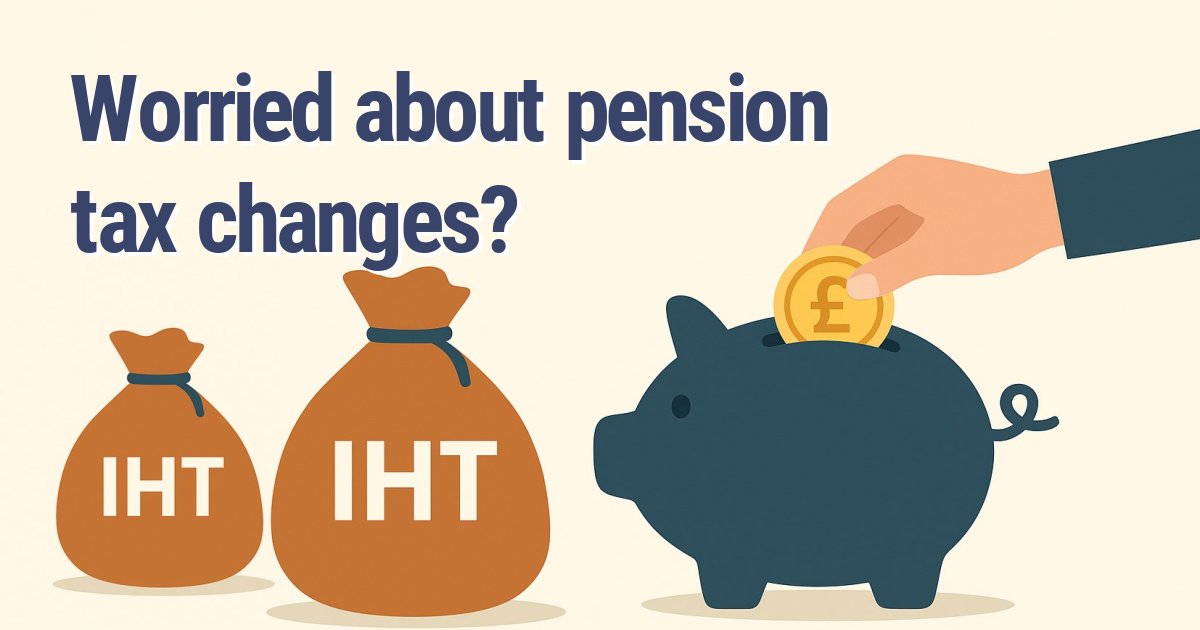How Inheritance Tax Rule Changes for Pensions Could Affect You
Tuesday 26 August, 2025
On 30 October 2024, the Chancellor of the Exchequer, Rachel Reeves, announced major changes to inheritance tax (IHT) on pensions as part of Labour’s Autumn Budget. These reforms, set to take effect from 6 April 2027, mark a significant shift in the tax treatment of unused pension funds upon death.
For those with pension savings intended for intergenerational wealth transfer, the changes may increase the tax burden on their estate and beneficiaries. Below, we explore the implications of these new rules and what they mean for your long-term financial planning.
Summary of the Inheritance Tax Rule Change for Pensions
Currently, most unused defined contribution and defined benefit pensions fall outside the taxable estate for IHT purposes. This has allowed many individuals to use pensions as an efficient vehicle for passing on wealth. If someone dies before age 75, the beneficiaries can typically withdraw funds tax-free; if they die after 75, income tax applies, but inheritance tax does not.
From 6 April 2027, this treatment will change. Under the new rules, the value of unused pension funds at the time of death will be included in the deceased person’s estate and subject to inheritance tax. This will apply to the majority of defined contribution and defined benefit pension schemes.
Additionally, responsibility for calculating and paying the IHT will shift to pension scheme administrators, not the estate’s executor or personal representative.
According to official estimates, approximately 10,500 estates will become newly liable for IHT under this policy, with a further 38,500 estates paying more tax than they would under current rules. These reforms are expected to raise around £1.5 billion annually by 2030.
Implications for Pension Holders and Their Beneficiaries
The changes mean that pension wealth, once considered outside the scope of IHT, may now be subject to a 40% tax charge where the total value of the estate exceeds the nil-rate threshold of £325,000 (or £500,000 including the residence nil-rate band, where applicable).
While transfers to a spouse or civil partner remain IHT-exempt, non-spousal beneficiaries could face significantly reduced inheritances as a result. The government has also confirmed a freeze on IHT thresholds until 2030, which, when combined with rising asset values and the inclusion of pensions, is likely to result in more estates being drawn into the inheritance tax net over time.
Moreover, since the responsibility for reporting and settling IHT on pension benefits will fall on scheme administrators from April 2027, there is potential for additional complexity and delays in probate as estates are settled.
Strategic Considerations for Pension Planning
These upcoming changes should prompt many individuals to review their estate planning strategy. Pensions may no longer offer the IHT shelter they once did, particularly for those intending to leave unspent pension savings to children or other non-spousal beneficiaries.
With less than a two year lead time before implementation, now is a good opportunity to reassess your approach. Potential strategies to consider include:
- Drawing down pensions sooner or more regularly
- Gifting assets under the seven-year rule
- Rebalancing wealth between pensions, ISAs, and property
- Reviewing death benefit nominations to ensure they align with your goals
It’s also important to review how your estate might be affected by the freeze in IHT thresholds and whether there are actions you can take in the near term to mitigate future liabilities.
Seeking Professional Financial Advice
Inheritance tax planning has always been a complex area, but the upcoming changes to pensions introduce additional challenges, and opportunities, for those with significant retirement savings.
Mark Cornes – Financial Adviser in Bristol said:
“At Thomas Oliver, our team of professional financial advisers can help you understand how the new rules may impact your legacy and explore personalised strategies to mitigate tax exposure. Whether you’re approaching retirement or already drawing from your pension, tailored advice can make a significant difference to your estate outcomes.”
Contact us today to review your pension and estate planning in light of the 2027 reforms.
Sources
- https://www.bbc.co.uk/news/articles/cx25w7qpr0yo
- https://www.gov.uk/government/publications/reforming-inheritance-tax-unused-pension-funds-and-death-benefits/inheritance-tax-on-unused-pension-funds-and-death-benefits
- https://www.professionalpensions.com/news/4516652/government-moves-forward-iht-pension-plans-april-2027#:~:text=Move%20expected%20to%20raise%20%C2%A31.5bn%20annually&text=The%20move%20is%20expected%20to,in%20the%20Autumn%20Budget%202024.
HM Revenue and Customs practice and the law relating to taxation are complex and subject to individual circumstances and changes which cannot be foreseen.
For specialist tax advice, please refer to an accountant or tax specialist.
Thomas Oliver UK LLP is an appointed representative of The Openwork Partnership, a trading style of Openwork Limited which is authorised and regulated by the Financial Conduct Authority.
Approved by The Openwork Partnership on 20/08/2025.






